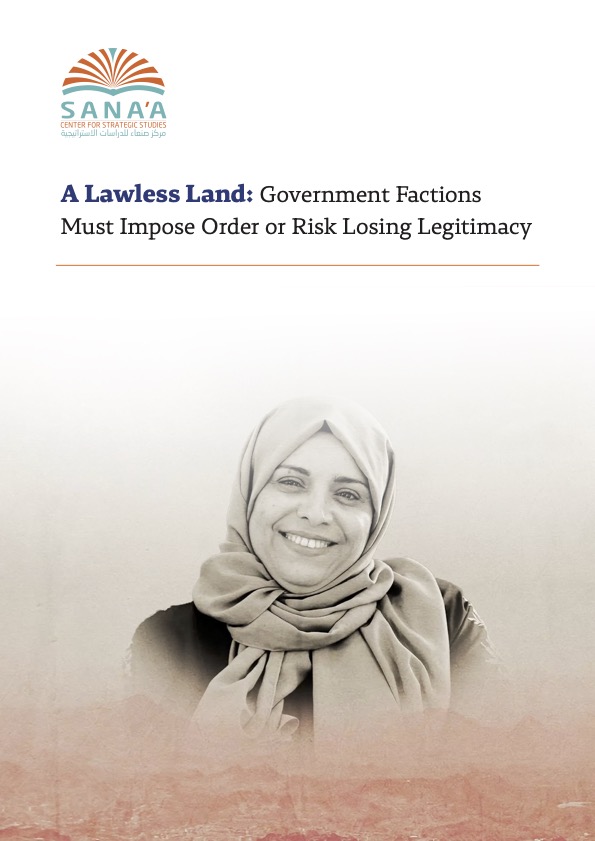The assassination of Taiz official Iftehan al-Mashhari in broad daylight is the starkest example yet of how political violence and impunity have taken root in the territories under the control of the Yemeni government. Her killing is the latest in a series of assassinations targeting those who threaten the financial interests of powerful warlords who have entrenched their positions during the conflict. These militants flout the law, carry out extrajudicial killings, and terrorize residents, while the nominal authorities either provide them with political cover or turn a blind eye. This pattern of lawlessness has persisted for over a decade. It is a direct consequence of the government’s failure to restrain affiliated armed groups and maintain law and order, undermining its claims to be a legitimate government for all Yemenis.
Al-Mashhari, manager of the Cleaning and Improvement Fund in the divided governorate of Taiz, which is split between Houthi and government control, was driving through the city center on September 18 when a gunman unleashed a volley of bullets at her car, instantly killing her and a bystander. The fund had been an attractive source of revenue for powerful individuals in armed groups, who siphoned off its resources for personal gain. When Al-Mashhari took office, she cracked down on corruption and restricted illicit access to funds. Investigations quickly linked the assassination to a notorious local militia, the 170th Air Defense Brigade. The gunman, who was later killed in a shootout with security forces, issued a video confession in which he said he had acted at the behest of militia leaders angered by Al-Mashhari’s actions.
The murder has provoked outrage in Taiz. Hundreds have staged regular protests outside local authority buildings demanding justice, a reform of the security sector, and the capture and return of suspects who have fled the governorate. But the major political powers in Taiz have used their respective media outlets to trade accusations of obstruction of justice and politicization of the killing. The Islah party is the major actor on the ground in the city, and while they have not been directly implicated in the murder, the party clearly bears responsibility for maintaining order and curbing abuses by rogue actors.
Notably, Taiz has also been the site of months of demonstrations, first organized by women, over the collapse in security and living standards under a dysfunctional government. Indeed, protests have broken out across southern cities in recent months amid interminable power outages, supply shortages, and inflation. The reality has only increased the outrage over murders of individuals such as Al-Mashhari, who were fighting to clean up the government. Her death may discourage others from seeking positions of power amid a broader climate of violence against women.
While the case speaks to a problem in Taiz specifically, one that the Sana’a Center warned about in 2018, the city is a microcosm of political violence seen across government-run territories. Forced disappearances and assassinations have become commonplace, as local warlords have been allowed to rule over entire neighborhoods. From 2018 to 2022, the Abductees’ Mothers Association documented 112 enforced disappearances in the government’s interim capital, Aden.
The problem of lawlessness cannot simply be put down to turf wars among rival political factions within the ruling Presidential Leadership Council (PLC). There is a complex intersection of criminal gangs, corrupt officials, warlords, and extremist groups underwriting the violence. However, political actors have been unwilling to rein these groups in for fear of losing influence. In effect, they have farmed out security responsibilities to lawless elements who terrorize and extort the local population.
Communities are now at a breaking point. The protests show they consider politicians to be complicit if they remain unwilling to take action. PLC president Rashad al-Alimi cannot let the issue stand as it is. His recent thank you to a local police chief is nowhere near enough. Instead, the government and local authorities must investigate and remove military and security leaders who commit or cover up violations, not just in Taiz but in all areas under government control. Measures should also be taken to safeguard ongoing protests as citizens exercise their right to free expression.
If the government cannot reestablish law and order, regional and international patrons will lose interest in helping Yemen. The state of lawlessness will only get worse if decisive action is not taken now.

 اقرأ المحتوى باللغة العربية
اقرأ المحتوى باللغة العربية